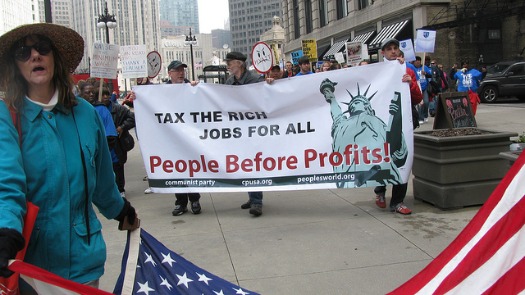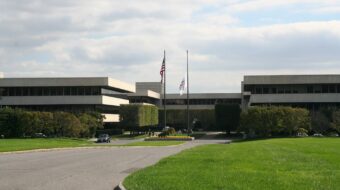
Some wealthy Americans have joined a campaign to “tax wealth like work.”
The campaign, part of United for a Fair Economy’s “Responsible Wealth” program, noted that massive cuts to taxes on capital gains and dividends did little more than to promote economic inequality and reduce revenue to balance the federal budget.
Capital gains, income through others’ labor related to property ownership in real estate, stocks, and other holdings, are taxed at a top rate of 15 percent. Income from actual work, however, is taxed at a top rate of 35 percent.
The disparity between the taxes on the two types of income costs the government $84 billion annually. Mike Lapham, director of the Responsible Worth network, notes that eliminating this disparity “would easily cover the federal budget cuts being hammered out this week, with funds left over to help cash-strapped states.”
Support from eliminating this disparity has come from diverse ideological sources, including the federal deficit commission and Congressional Progressive Caucus, which released its People’s Budget this week.
Investor Eric Schoenberg, who has joined the Tax Wealth Like Work campaign, said, “I know full well how our tax system is tilted to benefit Americans who live off of accumulated capital rather than labor income.”
“The vast majority of my income,” he explained, “comes from my investment portfolio. Last year my income was just over $200,000 and my taxes were only $2,000 – a mere one percent! Somebody making that in salary would have paid at least $30,000 more. Equalizing the tax rates paid by rich investors like me and working Americans would be an excellent start.”
According to analysis by the campaign, wealth inequality requires action. Capital gains and dividend income is heavily concentrated at the top of the income spectrum.
A typical middle-income household earning $58,000 takes in only about 0.5 percent of its income from capital gains. This means that family incomes for working families are automatically taxed at higher rates.
By contrast, the top 0.01 percent of households, who earn an average of $35 million, typically receives more than 44 percent of their income from capital gains. Adding dividends pushes it well over 50 percent. Simply put, the richest Americans receive the special privilege of having half of their income taxed at a much lower rate than the vast majority of working families.
Seattle-based Judy Pigott has also joined the campaign for tax parity. She is one of the heirs to her grandfather’s company that builds Peterbilt trucks and other heavy equipment. She explained, “If we even kept what was in place from the end of the Reagan years and into those of Bush I, I suspect we’d not be in a budget crisis now. Let’s do what it takes to support all of us, since it takes all of us to keep this nation going.”
The Congressional Progressive Caucus’ “People’s Budget” includes a progressive estate tax, increasing income taxes on those with incomes over one million a year, and restoring taxes on capital gains and dividend income to the same level as ordinary income.
Photo: Thousands of labor and community activists rallied in Chicago April 9 for nationwide “We Are One” actions. Teresa Albano/PW.

MOST POPULAR TODAY


Zionist organizations leading campaign to stop ceasefire resolutions in D.C. area

High Court essentially bans demonstrations, freedom of assembly in Deep South

Afghanistan’s socialist years: The promising future killed off by U.S. imperialism

Communist Karol Cariola elected president of Chile’s legislature






Comments